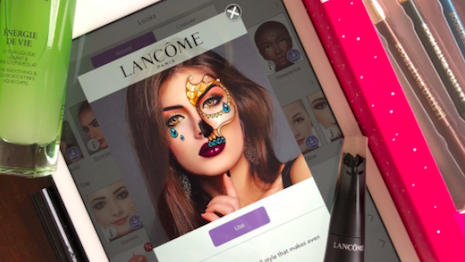- About
- Subscribe Now
- New York,
December 26, 2017

 Most consumers are not averse to ads in general, only obnoxious and irrelevant ones. Image credit: Lancôme
Most consumers are not averse to ads in general, only obnoxious and irrelevant ones. Image credit: Lancôme
Lancôme, Nordstrom and Bloomingdale's are among the brands considered data and targeting leaders, according to L2.
The report, which surveys the date collection and ad targeting landscape from the perspective of brands and retailers, found that ad-blocking is having a significant effect on how consumers interact with ads, but it is not necessarily a bad thing. Brands and retailers such as the three listed above are flourishing in spite of the rise of ad-blocking thanks to smart strategies.
Digital targeting
Since the dawn of the digital age, brands and retailers have been looking forward to the time when digital allows them to make hyper-personalized ads that target specific customers with accuracy and value.
Unfortunately, digital has been met with struggles as it attempts to meet those expectations, leading to sloppy ad targeting and a barrage of endless advertisements for consumers.
This has led directly to the rise of ad blocking as consumers are tired of being shown ads they have no interest in or connection to.
Nordstrom offers a host of services to ease holiday shopping. Image credit: Nordstrom
Seventy-five million Web users use ad blocking in the United States, more than a quarter of the Internet-using population, but the overwhelming majority of those users claim that they do not dislike seeing ads in general, only obnoxious or irrelevant ads.
This is the bright spot of hope for brands and retailers, as customers can still be effectively targeted with ads without damaging the reputation with the consumer.
L2 singles out a few retailers as leaders in the space, including Nordstrom and Bloomingdales, citing their adoption of advanced digital features that provide real value to the consumer and encourage them to engage organically, rather than inundating consumers with irrelevant and impersonal ads.
Innovative moves
It is apparent from looking at recent campaigns that the leaders in L2’s study have earned their spot.
For example, Lancôme is making its beauty products more accessible through a mobile device via a partnership with augmented reality application YouCam Makeup.
Giving users of the app the ability to test out products in a virtual environment, Lancôme will be offering trials of individual products and full looks that can be applied via AR. As part of this partnership, Lancôme will co-host a live-streamed show with a Halloween beauty tutorial on Oct. 30 (see story).
Similarly, Bloomingdale’s is offering a “beauty happy place” for cosmetics-lovers with a new boutique called Glowhaus.
The boutique will specialize in beauty products from a number of brands and will give customers a place where they can freely try out and test different combinations and products in a casual and freeform environment. The retailer is opening five boutiques at various Bloomingdale’s locations in New York and California (see story).
Bloomingdale's latest concept shop is a beauty boutique called Glowhaus. Image credit: Bloomingdale's
Nordstrom is easing the stress of the holidays by offering 24-hour curbside pickup for the week leading up to Christmas Eve.
Between Dec. 16-24, select Nordstrom locations will offer 24/7 curbside pickup to help consumers through the often hectic gifting buying season. Nordstrom’s introduction of 24/7 curbside pickup is part of the retailer’s greater effort to improve its shopping experience during a time when consumers ought to be with friends and family, not stressed, rushing store to store (see story).
These projects are all indicative of retailers that understand how to create value for customers, and therefore can survive the challenges put forward be ad-blocking.
Share your thoughts. Click here